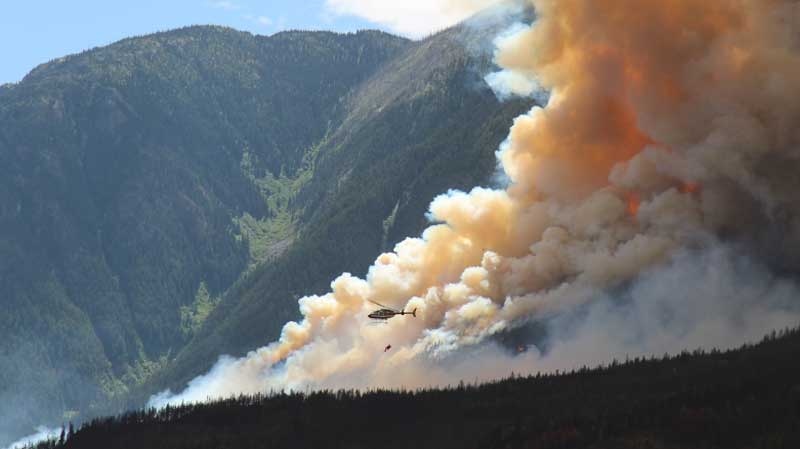CN loses appeal of $16M penalty for causing destructive B.C. wildfire
 The Cisco Road wildfire, discovered on June 11, 2015, burns outside Lytton, B.C. (Wildfire Management Branch)
The Cisco Road wildfire, discovered on June 11, 2015, burns outside Lytton, B.C. (Wildfire Management Branch)
The Canadian National Railway must pay the B.C. government $16.2 million for causing a destructive 2015 wildfire in the Fraser Canyon, the province's highest court has ruled.
B.C.'s fire manager determined the approximately 2,400-hectare blaze was sparked as a result of illegal rail cutting near Lytton – the community that would be devastated by another wildfire six years later – and ordered CN Rail to reimburse the province for lost land value, firefighting costs and other expenses in 2018.
The company accepted responsibility for accidentally igniting the flames during a period of high winds and extreme fire danger, but challenged the amount of the penalty, accusing the B.C. Wildfire Service of exacerbating the situation with a controlled burn that led to additional spread.
CN Rail's arguments were first rejected by the province's Forest Appeals Commission in 2020, then the B.C. Supreme Court in 2022, then the B.C. Court of Appeal last week.
"This dispute has been outstanding for almost nine years, and decisions have been rendered by three different decision-makers," Justice Janet Winteringham wrote in an Aug. 28 ruling, on behalf of the appeal court's three-judge panel.
"The commission reviewed the evidence tendered in considerable detail and explained why it made particular findings … The chambers judge, correctly, gave deference to the commission."
CN Rail's case focused on a June 17 controlled burn that lasted for weeks, scorching hundreds of hectares of land.
The company argued such an operation was unnecessary – and did not meet the definition of "fire control" under the province's Wildfire Act, which allows the government to claw back costs of "fire control" for wildfires caused by illegal activity.
CN relied on expert witness Gregory Guyan of California, who had never visited the Lytton area before giving his opinion, but suggested the controlled burn needlessly increased the size of the fire by one-third.
The operation was intended to prevent the fire from spreading further southward – something Guyan argued could have been accomplished by targeted suppression efforts on the southern flank instead.
The commission weighed his opinion against those of four people involved in the firefighting effort, including James Richardson, B.C.’s wildfire preparedness officer, who told the Forest Appeals Commission the burn “went perfectly,” and achieved the desired objective.
He noted the prevailing winds in the area shift over the summer months, and begin blowing from the north – which would have fanned the flames quickly, particularly given the hot and dry conditions.
Winteringham also pointed to testimony from Tim Ewart, a certified incident commander with the BCWS since 1996, who called Guyan's alternative suggestion for a direct attack unrealistic, given the challenging topography around the flames and the fire's extreme behaviour at the time.
The justice accepted CN’s position that the Forest Appeals Commission can assess "particular fire suppression strategies" when deciding whether the government is entitled to recover costs – but found it had done so while rejecting Guyan's opinion.
"The province’s witnesses explained why the ignition operation was necessary to control the fire. The commission accepted their explanation," the judge wrote.
"These witnesses were well-versed in forest fires in this complex terrain. Based on the evidence, the commission determined that the cost of the ignition operation and the resulting damage to resources was directly or indirectly caused by CN’s contravention."
CTVNews.ca Top Stories

BREAKING Donald Trump picks former U.S. congressman Pete Hoekstra as ambassador to Canada
U.S. president-elect Donald Trump has nominated former diplomat and U.S. congressman Pete Hoekstra to be the American ambassador to Canada.
Genetic evidence backs up COVID-19 origin theory that pandemic started in seafood market
A group of researchers say they have more evidence to suggest the COVID-19 pandemic started in a Chinese seafood market where it spread from infected animals to humans. The evidence is laid out in a recent study published in Cell, a scientific journal, nearly five years after the first known COVID-19 outbreak.
Border agency detained dozens of 'forced labour' cargo shipments. Now it's being sued
Canada's border agency says it has detained about 50 shipments of cargo over suspicions they were products of forced labour under rules introduced in 2020 — but only one was eventually determined to be in breach of the ban.
This is how much money you need to make to buy a house in Canada's largest cities
The average salary needed to buy a home keeps inching down in cities across Canada, according to the latest data.
Canada's space agency invites you to choose the name of its first lunar rover
The Canadian Space Agency (CSA) is inviting Canadians to choose the name of the first Canadian Lunar Rover.
Hong Kong activist Jimmy Lai denies he asked a newspaper colleague to draft list of sanction targets
Former publisher Jimmy Lai denied that he asked a colleague to draft a list of potential sanction targets in his second day of testimony Thursday at his landmark national security trial in Hong Kong.
Australia's parliament considers legislation banning social media for under 16s
Australia’s communications minister introduced a world-first law into Parliament on Thursday that would ban children younger than 16 from social media, saying online safety was one of parents’ toughest challenges.
'My two daughters were sleeping': London Ont. family in shock after their home riddled with gunfire
A London father and son say they’re shocked and confused after their home was riddled with bullets while young children were sleeping inside.
Smuggler arrested with 300 tarantulas strapped to his body
Police in Peru have arrested a man caught trying to leave the country with 320 tarantulas, 110 centipedes and nine bullet ants strapped to his body.

































